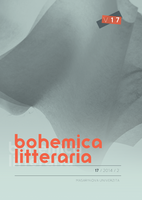Tkadleček: vernakularizace filozofického myšlení
Tkadleček: philosophical thinking turning vernacular
Author(s): Daniel SoukupSubject(s): Cultural history, Czech Literature, Philosophy of Middle Ages, 15th Century, Pastoral Theology, Sociology of Religion
Published by: Masarykova univerzita nakladatelství
Keywords: Medieval Literature; Consolatio; Consolatory Rhetoric; Vernacularization; Literary Genres; Tkadleček; Johannes von Tepl; Der Ackermann aus Böhmen – The Ploughman from Bohemia; Meister Eckhart; Lay Pie
Summary/Abstract: In the Old Czech composition Tkadleček (The Weaver; after 1407) the late medieval Bohemian literature achived its pinnacle; it is considered one of the most important works of Czech literary canon. The origin of this anonymous work can be traced back to an extraordinary German text Ackermann aus Böhmen (The Ploughman from Bohemia; around 1400) by Johannes von Tepl. Both compositions are linguistically sublime and present compelling problems, aspiring to more than mere linguistic artistry. The paper focuses on a genre analysis of the text, demonstrating that Tkadleček belongs to the tradition of consolatory rhetoric, drawing special attention to the context of lay piety and pastoral care in Late Middle Ages.
Journal: Bohemica litteraria
- Issue Year: 17/2014
- Issue No: 2
- Page Range: 27-53
- Page Count: 27
- Language: Czech

